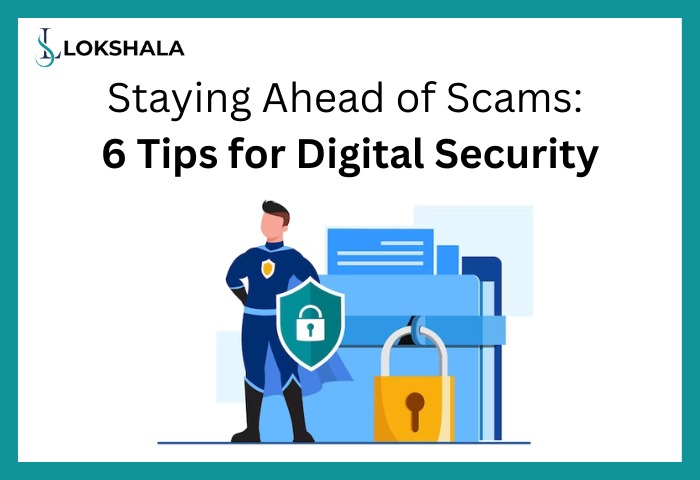In today’s fast-paced digital era, where our lives are intricately intertwined with technology, the importance of safeguarding our personal information cannot be overstated. With the rising tide of scams and frauds, adopting preventive measures is paramount to ensure a secure online environment or digital security. Let’s discuss six essential tips to protect yourself from the pitfalls of mobile scams and frauds and enhance your digital security:
1. Lock Your Devices
Securing your devices is The first defence against unauthorised access to your personal information. Whether it’s a laptop, phone, or tablet, make it a habit to lock them whenever you step away. Implementing a strong password, PIN, or fingerprint lock acts as a robust barrier against potential hackers or scammers, ensuring the safety of your data.
2. Encrypt and Secure External Storage
Fortifying your data against breaches is equally important. Encrypt and lock up external storage devices like flash drives to add an extra layer of protection. By doing so, even if anyone gets physical access to the storage devices, they won’t be able to view or misuse your sensitive information, enhancing the overall security of your data.
3. Mindful App Permissions
When downloading apps, exercising caution and being mindful of the permissions they require can significantly enhance your privacy. Review the permissions carefully and grant only essential access. You minimise the risk of unnecessary data exposure by selectively managing app permissions, especially restricting access to sensitive data.
4. Choose Trusted Software
Opting for genuine and trustworthy software is crucial for the overall security of your digital life.
a. Opt for Legitimate Apps
Choose legitimate apps from official app stores, as they undergo regular checks and updates to fix vulnerabilities and maintain security standards. Genuine software not only provides access to the latest features but also strengthens your defence against online threats.
b. Be Wary of Unverified Sources
Exercise caution when seeking software applications and avoid unofficial or suspicious sources. Just stick to reputed websites and official app stores to minimise the risk of installing malware or exposing your device to potential threats.
5. Backup Your Files
Protecting your important files goes beyond data security. Regularly backing up your data files ensures you can easily retrieve essential information despite unexpected challenges.
a. Use External Hard Drives or Cloud Services
Please back up your files by copying them to a secure cloud service or locally to an external hard drive. This precautionary measure becomes invaluable in case of viruses, hardware malfunctions, or accidental deletions, reducing the risk of permanent data loss.
b. Set Automatic Backups
Simplify the backup process by setting up automatic backups. Many cloud storage providers offer options for continuous real-time syncing, ensuring your data is constantly safeguarded without requiring manual effort.
6. Verify Calls from Customer Care
Exercise caution when receiving phone calls from customer care or help desk representatives, as fraudsters can disguise themselves as legitimate entities.
a. Avoid Screen-Sharing Apps
Be cautious if customer care representatives request the installation of third-party screen-sharing apps. Legitimate organisations usually have secure methods for remote issue resolution and do not ask customers to install such apps.
b. Authenticate Calls through Official Channels
Always authenticate calls through official channels. If in doubt, contact the organisation’s customer support directly using the official phone number listed on their website or official documents.
By implementing these six essential tips into your digital routine, you may drastically lower your vulnerability to fraud and scams and enhance your digital security. Remember, staying vigilant and adopting preventive measures are key to safeguarding your personal information in the ever-evolving digital landscape.
Stay secure, stay vigilant!


